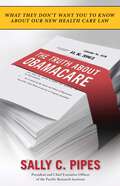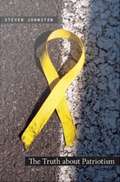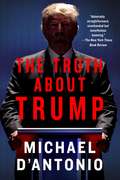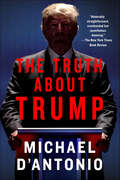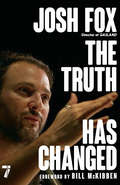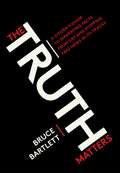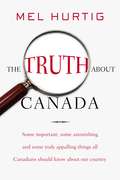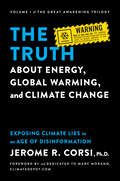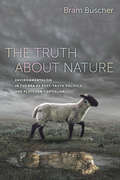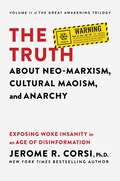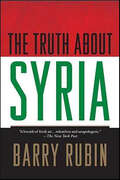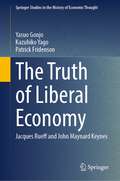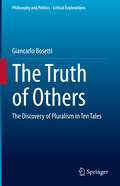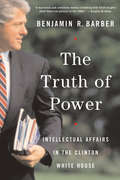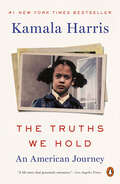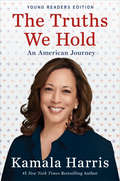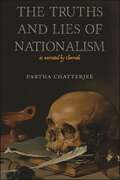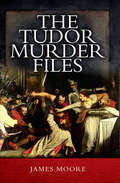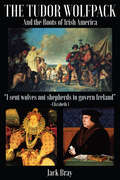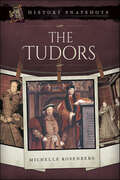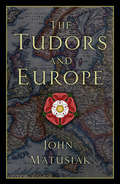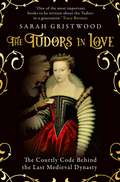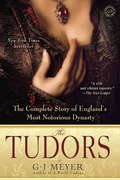- Table View
- List View
The Truth About Obamacare
by Sally C. PipesIn her new book, The Truth About Obamacare, Sally C. Pipes-president of the Pacific Research Institute and an acknowledged expert on health care reform-reveals what Democrats in Congress and President Obama don't want you to know: Obamacare is even worse than most critics suspect. Debunking the myths that the current administration has touted, Pipes shows exactly what the new health care law will mean for you, your family, your doctor, and your wallet. She also reveals how, contrary to its promises, Obamacare will make health care more expensive, limit your options, lead to deteriorating medical care, and weaken America's already frail economy.
The Truth About Patriotism
by Steven JohnstonThe Truth about Patriotism is a bracing repudiation of the claim that patriotism is essential--or even beneficial--to democracy. Contending that even at its best patriotism subverts the democracy it purports to value, Steven Johnston turns to patriotism's defenders to show how they must jettison much of democracy to champion patriotism. Closely examined, patriotism itself effectively demonstrates the impossibility of love of country. Patriotism, Johnston argues, tends toward narcissistic self-regard, blind to its violent ways of being in the world and its dependence on death. Thus we would be better off without it. Drawing largely from aspects of American political and popular culture, this wide-ranging book presents a wealth of examples to disclose patriotism's self-defeating character. They include Richard Rorty's and John Schaar's enmity-driven love of country, Socrates's angry judicial suicide, the violent obsessions of High Noon and Saving Private Ryan, the triumphalist self-display of the World War II Memorial, Oliver Stone's and Don DeLillo's spectacular representations of the assassination of President Kennedy, George W. Bush's symbolic sacrifice of more Americans in commemoration of September 2001, and yet other memorials to and apologies for patriotism. Ultimately, Johnston calls for a vision of democracy that uses the tragic possibilities inherent in politics as a spur to a life-affirming civic ethos of reciprocal generosity.
The Truth About Trump
by Michael D'AntonioFor all those who wonder, "Just who is Donald Trump?", The Truth About Trump supplies the answer. Drawing upon exclusive interviews and exhaustive research, Pulitzer Prize-winning reporter Michael D'Antonio presents Trump's full story, from his beginnings as a businessman to his juggernaut presidential campaign. Along the way, D'Antonio charts the successes and failures, scandals and triumphs, and relentless pursuit of money and fame that have made Trump who he is today. D'Antonio also details the origins of the Trump family fortune, Trump's history of using politics to get ahead, and how he has mastered the media to turn publicity into power. First published in 2015, and now updated to cover Trump's rise to political prominence, The Truth About Trump is an unsparing, eye-opening account of the life and career of the most talked-about man in America. “A carefully reported and fair-minded account.”―USA Today “A brisk and entertaining read, drawing on interviews and documents and distilling decades' worth of news coverage to tell the story of Trump's childhood, family, business deals, and political forays.” ―The Washington Post "Balanced, well sourced, and perfectly timed."―Financial Times (UK)
The Truth About Trump
by Michael D'AntonioWho is the man shaking up the GOP?What does he really stand for?How far will he go in his pursuit of power?This isTHE TRUTH ABOUT TRUMPHe is one of the world’s most successful businessmen—and a man who many Americans love to hate. So how did Donald Trump become a serious contender in the race for the country’s highest office? His critics think his run for president is a marketing campaign for the Trump brand. His supporters believe that he can make America great again. The only thing both sides can agree on is that Trump is a man whose appetite for wealth, attention, power, and conquest is insatiable. In this up-close-and-personal biography, author Michael D’Antonio draws upon extensive and exclusive interviews with Trump himself to present the full story behind this American icon—from his early life to the headlines of today. “Carefully reported and fair-minded.”—USA Today “A brisk and entertaining read.” —The Washington PostPreviously published in hardcover as Never Enough.
The Truth About the IRS Scandals
by Charles C. JohnsonThe IRS scandal is far more complicated than it appears-and more pernicious. Its roots go back to its founding but modern technology has accelerated the harm that a few malicious IRS administrators can do to their political enemies.Lois Lerner, the woman at the center of the congressional probe into the targeting of conservative groups, called the Tea Party "very dangerous" and hoped it could be used to roll back a pro-free speech court case, Citizens United v. Federal Election Commission (2010). Lerner conspired with her old colleagues at the FEC to leak confidential tax information. She even acted to retroactively award tax exempt status to politically connected charities while targeting for destruction those committed to truth.Leaking sensitive information about individuals and organizations is par for the course for committed ideologues in the Obama Administration who rely on an apparatus of far left think tanks and their allies in the press to spin narratives that keep the Washington elite in control. The far left's friends in Congress and the IRS, meanwhile, are doing everything they can to make sure the truth is never brought to light by spinning about what really happened.This Broadside will expose the tax collector conspiracy that kneecapped the Tea Party, one of the greatest citizen uprisings in American history, and educates citizens about what has been done so that they might prevent it from ever happening again. Knowledge, particularly of the arcane regulations of the tax code, is power; a lawless tax collector class can only be curtailed by an active citizenry.The Truth About the IRS Scandals is necessary because only the truth will set Americans free.
The Truth Has Changed
by Josh FoxThe Emmy Award–winning creator of GASLAND tells his intimate and damning, personal story of our world in crisis. With a foreword by Bill McKibben. The rules have changed. The water has changed. The climate has changed. The truth has changed. We must change. In The Truth Has Changed, Josh Fox turns the rapid-fire shocks that are remaking the very fabric of our lives—writing as a first responder, a reporter, a documentarian, and an activist—into art, literature, and at least one answer to the question of what the future holds. Our normal isn’t normal anymore. The paradigm shift that global warming represents parallels a paradigm shift in how we process truth. Both deeply affect democracy. Josh Fox has had a front row seat—a first responder after 9/11, filming the Deepwater Horizon spill close up from the air and on the ground, a member of Bernie Sanders’s delegation of the Democratic Platform Committee, risking his life to cross a bridge on Thanksgiving Day at Standing Rock, traveling the nation and the world, shooting his films, talking to people everywhere he goes. The Truth Has Changed is his first book, the companion to his new one-man show of the same title, and it’s beautiful.
The Truth Matters: A Citizen's Guide to Separating Facts from Lies and Stopping Fake News in Its Tracks
by Bruce BartlettDistinguish fake news from reliable journalism with this clear and concise handbook by New York Times best-selling author Bruce Bartlett.Today’s media and political landscapes are littered with untrustworthy sources and the dangerous concept of “fake news.” This accessible guide helps you fight this deeply troubling trend and ensure that truth is not a permanent casualty. Written by Capitol Hill veteran and author Bruce Bartlett, The Truth Matters presents actionable tips and tricks for reading critically, judging sources, using fact-checking sites, avoiding confirmation bias, identifying trustworthy experts, and more.
The Truth about Canada: "Some Important, Some Astonishing, and Some Truly Appalling Things All Canadians Should Know About Our Country"
by Mel HurtigRenowned as a passionate Canadian, bestselling author Mel Hurtig has combed through world statistics to see how Canada really measures up -- and the results are astonishing, and often shocking.This book is about how Canada has changed, very much for the worse, in the last twenty years. As a result of these profound (often hidden) changes, we are no longer the people we think we are. To take one example, the Canadian media usually leaves us with the impression that Canadians are really heavily taxed. Yes, compared to the U.S.A., the usual point of comparison. No, compared to other countries with our standard of living, other OECD countries, for example; there we come in 23rd on the high-tax scale.The shocks in this book build up, chapter by chapter. How do we rank in the world in voter turnout? Try 109th. Number of physicians per 100,000 population? Try 54th. Our rank in reducing pollution? 126th out of 146 countries.Some of the statistics are internal, comparing Canada then and now. They back up two of the book's most powerful themes: the failure of Canadian big business to turn record profits into ongoing investment in our country, and (no coincidence) the sellout of our assets at a rate that no other country would allow.This statistics-based book ranges across all areas of our lives -- including health, wages, productivity, culture, the media ("the most concentrated in the world"), and much else. Mel Hurtig's message is that we can't do anything to fix the direction we're drifting in unless we recognize it -- and recognize The Truth About Canada.From the Hardcover edition.
The Truth about Energy, Global Warming, and Climate Change: Exposing Climate Lies in an Age of Disinformation
by Jerome R. CorsiThis book exposes the truth that the climate change hoax is a political movement aimed at eliminating capitalism by spreading alarming disinformation that in order to &“save the Earth&” from global warming, we must reduce carbon dioxide emissions by switching from hydrocarbon fuels to renewable energies.The Truth about Energy, Global Warming, and Climate Change: Exposing Climate Lies in an Age of Disinformation reveals a science-based understanding of Earth&’s climate and temperature that Green New Deal proponents are trying to hide. In the pages of this book, you will see scientifically documented evidence for many facts that the radical left denies. Want to know the truth about how energy, temperature, and climate work? Read The Truth about Energy, Global Warming, and Climate Change—but prepare to be shocked. Jerome R. Corsi has conducted a tour-de-force examination of peer-reviewed climate science that exposes the neo-Marxists behind today&’s anti-capitalist global warming hoax.
The Truth about Nature: Environmentalism in the Era of Post-truth Politics and Platform Capitalism
by Bram BüscherHow should we share the truth about the environmental crisis? At a moment when even the most basic facts about ecology and the climate face contestation and contempt, environmental advocates are at an impasse. Many have turned to social media and digital technologies to shift the tide. But what if their strategy is not only flawed, but dangerous?The Truth about Nature follows environmental actors as they turn to the internet to save nature. It documents how conservation efforts are transformed through the political economy of platforms and the algorithmic feeds that have been instrumental to the rise of post-truth politics. Developing a novel account of post-truth as an expression of power under platform capitalism, Bram Büscher shows how environmental actors attempt to mediate between structural forms of platform power and the contingent histories and contexts of particular environmental issues. Bringing efforts at wildlife protection in Southern Africa into dialogue with a sweeping analysis of truth and power in the twenty-first century, Büscher makes the case for a new environmental politics that radically reignites the art of speaking truth to power.
The Truth about Neo-Marxism, Cultural Maoism, and Anarchy: Exposing Woke Insanity in an Age of Disinformation
by Jerome R. CorsiThis book exposes the dark, evil ideology that has descended over America. The arch of the Hegelian dialectic culminates only in negation, with millions annihilated in the nightmare apocalypse of post-modernist Democratic Socialism.The Truth about Neo-Marxism, Cultural Maoism, and Anarchy: Exposing Woke Insanity in an Age of Disinformation reveals how Communist ideology has evolved into its present-day woke madness that began with Immanuel Kant and Georg Wilhelm Friedrich Hegel, continued through Antonio Gramsci and the Frankfurt School, and concluded with post-modern thinkers like Jean Baudrillard. Want to understand why the neo-Marxists, cultural Maoists, and anarchists of the woke critical theory radical Left live in a fundamentally different view of reality, operating with a set of values that redefines truth to be subjective? Read The Truth about Neo-Marxism, Cultural Maoism, and Anarchy—but be prepared to be shocked. Jerome R. Corsi has conducted a tour-de-force examination of philosophical texts, modern critical theory treatises, and the murderous history of Communism under Stalin and Mao that exposes the neo-Marxists behind today&’s anti-capitalist woke schizophrenia.
The Truth about Syria
by Barry RubinSyria has long presented a serious problem for the Middle East region and U.S. policy. With its mix of competing religious and ethnic groups, radical ideologies, and political repression, it is a 72,000-square-mile time bomb waiting to go off. Yet surprisingly, very little is known about this country and the role it has played in shaping the destiny of the Middle East. In The Truth about Syria, Middle East expert Barry Rubin looks at the critical issues that have made the country the powderkeg of the Middle East and offers an insightful analysis of the effects of recent developments.
The Truth of Liberal Economy: Jacques Rueff and John Maynard Keynes (Springer Studies in the History of Economic Thought)
by Kazuhiko Yago Patrick Fridenson Yasuo GonjoThis book provides historical, theoretical, and biographical perspectives on two giants of contemporary economics, Jacques Rueff (1896-1978) and John Maynard Keynes (1883-1946). The former French bureaucrat and academician championed classical economics; the latter British economist founded macro-economics criticizing the classical school. Depending upon archival sources, including personal correspondences between the above two figures, the book describes furious debates between them and surrounding them.In fact, the two economists proposed contrasting diagnosis over almost every event in contemporary world economy: the reparations problem, the Great Depression, the gold exchange standard, and the Bretton Wood System. Keynes appraised managed currency to cope with unemployment, criticizing the classical gold standard; Rueff believed the function of market mechanism, blaming the state intervention. The book highlights deep influence of Rueff, rather larger than Keynes, in Europe before and after WWII.The perspective of the book reaches today’s economic issues. The classical view of Rueff was shared in Mont Pelerin Society, a cradle of neo-liberalism. Rueff’s market-friendly view paved way to the neo-liberal reforms which took place after the 1980s. The classical market theory of Rueff, together with dialogues with the labor unions, prepared the social background of the European Union. This book thus reveals the truth of liberal economy, from the 20th to 21st centuries.
The Truth of Others: The Discovery of Pluralism in Ten Tales (Philosophy and Politics - Critical Explorations #25)
by Giancarlo BosettiThis book offers an account of ten crucial moments in the history of ideas, which represent ten key moments of the discovery of pluralism. From the Indian emperor Ashoka to Origen and from Nicola Cusano to Las Casas, Montaigne, Lessing, giants who opened the way to the thought of tolerance, challenging the dogma of a unique truth dictated by authority, followed in this reconstruction by other glowing thinkers of the twentieth century, such as Horace Kallen, Margaret Mead, and Jacques Dupuis. These protagonists, each in their own way, battled against monism for the respect of differences and for the knowledge of otherness. This kind of hall of fame of pluralist thinkers ends with the most important figure of the pluralism of values, Isaiah Berlin, of whom an unpublished interview appears here for the first time in English. The volume is unique in this two-thousand-year-old variety of voices gathered under the denominator of cultural pluralism that they embody in the deepest and most challenging sense, often at the limits and beyond the limits of heresy. It is of great value and interest to scholars and students of theoretical, moral, political philosophy, sociology, comparative studies, comparative literature, religious diversity, religious studies, anthropology, and all those interested in the history of tolerance.
The Truth of Power: Intellectual Affairs in the Clinton White House
by Benjamin R. BarberIdeas and the presidency flirt with each other, but can they really get along? President Clinton had a romance with big ideas. He intently cultivated intellectuals, seducing them with his characteristic charm and with the promise of real influence on the political stage. Yet most often he disappointed the big thinkers whose advice he sought. Benjamin Barber was first invited to Camp David in 1994, along with other prominent members of the academic community, to participate in a "seminar" with President Clinton on the future of Democratic ideas and ideals. Afterwards, he became a steady informal adviser to the White House. For a politically committed professor like Barber, the opportunity was exhilarating--here was an opportunity to put ideas into action, to link ideas to power. The result was enlightening, if unexpected. The most unpredictable factor was the president himself: a man of astonishing intellectual gifts, a consummate listener and synthesizer of ideas, who nonetheless failed to present a stirring progressive vision or even to craft a memorable speech. With great perceptiveness, wit, and élan, Barber provides a startling meditation on truth and power--and the truth of power, which is the responsibility of the elected not to an idea but to the electorate. He identifies the fault lines that future progressive candidates must straddle if they are to win--and the gift they must have, if they are to be great, of calling forth the best in their fellow citizens. In the end, Barber give us a unique portrait of our compelling and maddening ex-president, and the hopes and disillusionments he represents.
The Truths We Hold: An American Journey
by Kamala HarrisThe #1 New York Times bestsellerFrom Vice President Kamala Harris, one of America's most inspiring political leaders, comes a book about the core truths that unite us and how best to act upon them. "A life story that genuinely entrances." —Los Angeles Times&“An engaging read that provides insights into the influences of [Harris&’s] life...Revealing and even endearing.&” —San Francisco ChronicleThe daughter of immigrants and civil rights activists, Vice President Kamala Harris was raised in an Oakland, California, community that cared deeply about social justice. As she rose to prominence as one of the political leaders of our time, her experiences would become her guiding light as she grappled with an array of complex issues and learned to bring a voice to the voiceless. In The Truths We Hold, she reckons with the big challenges we face together. Drawing on the hard-won wisdom and insight from her own career and the work of those who have most inspired her, she communicates a vision of shared struggle, shared purpose, and shared values as we confront the great work of our day.
The Truths We Hold: An American Journey (Young Readers Edition)
by Kamala HarrisAdapted for young readers, Vice President Kamala Harris's empowering memoir about the values and inspirations that guided her life.With her Democratic presidential nomination, her election to the vice presidency, her election to the U.S. Senate, and her position as attorney general of California, Kamala Harris has blazed trails throughout her entire political career. But how did she achieve her goals? What values and influences guided and inspired her along the way? In this young readers edition of Kamala Harris&’s memoir, we learn about the impact that her family and community had on her life, and see what led her to discover her own sense of self and purpose. The Truths We Hold traces her journey as she explored the values she holds most dear—those of community, equality, and justice. An inspiring and empowering memoir, this book challenges us to become leaders in our own lives and shows us that with determination and perseverance all dreams are possible.
The Truths and Lies of Nationalism as Narrated by Charvak
by Partha ChatterjeeRejects Hindu nationalism and pluralist secularism in favor of a revitalized politics of Indian federalism.Written in the voice of the mythical atheist, naysayer, and general all-purpose heretic of Indian philosophy, The Truths and Lies of Nationalism as Narrated by Charvak presents a completely new way of telling the history of Indian nationalism. Severely criticizing the doctrines of both Hindu nationalism and pluralist secularism, it examines the ongoing debates over Indian civilization and recounts in detail how the present borders of India were defined by British colonial policy, the partition of 1947, and the integration of the princely states and the French and Portuguese territories. The emphasis is not so much on the state machinery inherited from colonial times but on the moral foundation of a new republic based on the solidarity of different but equal formations of the people. After a trenchant critique of the present-day conflicts over religion, caste, class, gender, language, and region in India, the book proposes a new politics of revitalized federalism. Intended for a general readership, and eschewing academic jargon, this book will be of interest to anyone concerned about the future of India.
The Tudor Murder Files
by James Moore&“Collates the most shocking killings and puzzling murder mysteries from the sixteenth century in fascinating detail&” —Gazette & Herald In the Tudor age the murder rate was five times higher than it is today. Now, this unique true crime guide, The Tudor Murder Files, reveals just how bloody and brutal this fascinating era really was. From the dark days of Henry VIII to the turbulent times of Shakespeare, James Moore&’s new book is the first to chart the period&’s most gripping murder cases in all their grizzly detail. Featuring tales of domestic slaughter, sexual intrigue, and cunning assassinations, as well as murder mysteries worthy of Agatha Christie, the book vividly brings to life the violent crime wave that gripped the sixteenth century both at home and abroad. Enter a world in which stabbings were rife, guns were used to kill victims for the first time, and in which culprits frequently escaped justice. The book also reveals just how severe some of the penalties could be, with grisly punishments for those who dared to commit the gravest of crimes. Discover how one murderer was gruesomely pressed to death, another boiled alive for poisoning his victims, and meet some of history&’s most notorious serial killers, including one considered so barbaric she was labelled a vampire. &“Contains more than seventy real life murders, profiling over thirty cases in detail. And not only does James chart how killers were caught and dealt with by the justice system, he also discusses how murders were reported to the new, news hungry nation.&” —Luton Today
The Tudor Wolfpack: And the Roots of Irish America
by Jack Bray“The gripping story of the wolves the British sent to govern the Irish . . . Miracles abound in this action-packed history.” —Kathleen Kennedy Townsend, Former Lieutenant Governor of Maryland “The Irish people have suffered mercilessly at the hands of conquerors over the past thousand or so years . . . The Normans tried with only limited success to conquer the Irish in 1167, a hundred years after their takeover of England . . . Irish resistance to British rule provoked a lengthy war between the clans of the Irish chieftains and the English soldiers . . . They confiscated the lands once more and instituted such harsh and outrageous controls that it ultimately resulted in the great Irish emigration to the United States. Jack Bray tells this thrilling story from an immense wealth of knowledge and such a writer’s eye for detail that no one even remotely interested in the period will want to miss it.” —from the Foreword by Winston Groom, New York Times–bestselling author of Forrest Gump“The Irish are a storytelling people and Jack Bray is one of them. And what a story he has written: the centuries of tragedy ending in the building of a great country across the sea, America. Deeply researched and deeply felt, The Tudor Wolfpack and the Roots of Irish America has a brave and musical heart.” —Richard Reeves, national bestselling author of President Kennedy: Profile of Power “Combining the soul of Ireland’s ancient storytelling seanchaí with the great talent and skill of an American lawyer-historian, Jack Bray tells a powerful story about the military conquest and colonization of Ireland in the sixteenth and seventeenth centuries.” —Edward J. Markey, United States Senator, Massachusetts
The Tudors (History Snapshots)
by Michelle RosenbergDiscover more about the famous Tudor monarchs, from Henry VII to Elizabeth I.Everything you never knew about the powerful Tudor dynasty - from Henry VII to the glorious Elizabeth I. From Battles at Bosworth to battles for supremacy of the royal bedchamber, marriage, war, murder, divorce, religious dissent, Renaissance letters, science and art, political alliances, the Reformation, treason, a Virgin Queen, phantom pregnancies, global exploration, bloody beheadings and a fresh look at why Henry VIII became such a terrifying tyrant.
The Tudors and Europe
by John MatusiakIn 1517, a certain Dr Beale, rector of St Mary Spitall in London, had roused the capital’s mob by laying the blame for an increase in poverty squarely upon the shoulders of grasping foreigners. ‘God has given England to Englishmen,’ he fumed, and ‘as birds would defend their nest, so ought Englishmen to cherish and defend themselves and to hurt and grieve aliens for the common weal.’ But migration was not the only factor influencing Tudor attitudes to Europe. War, religion, commerce and dynastic security were all critical in linking England to developments abroad, and in ways that remain strikingly relevant today. What were the forces that shaped the shifting perspectives of Tudor men and women and their rulers towards a continent at the crossroads? And what, in turn, were the responses of sixteenth-century Europeans to their counterparts across the Channel? The Tudors and Europe looks at a time when the very survival of England hung critically in the balance and asks if it has lessons for the present.
The Tudors in Love: Passion and Politics in the Age of England's Most Famous Dynasty
by Sarah GristwoodSarah Gristwood's The Tudors in Love offers a brilliant history of the Tudor dynasty, showing how the rules of romantic courtly love irrevocably shaped the politics and international diplomacy of the period.Why did Henry VIII marry six times? Why did Anne Boleyn have to die? Why did Elizabeth I's courtiers hail her as a goddess come to earth?The dramas of courtly love have captivated centuries of readers and dreamers. Yet too often they're dismissed as something existing only in books and song--those old legends of King Arthur and chivalric fantasy.Not so. In this ground-breaking history, Sarah Gristwood reveals the way courtly love made and marred the Tudor dynasty. From Henry VIII declaring himself as the ‘loyal and most assured servant' of Anne Boleyn to the poems lavished on Elizabeth I by her suitors, the Tudors re-enacted the roles of the devoted lovers and capricious mistresses first laid out in the romances of medieval literature. The Tudors in Love dissects the codes of love, desire and power, unveiling romantic obsessions that have shaped the history of the world.
The Tudors in Love: The Courtly Code Behind the Last Medieval Dynasty
by Sarah Gristwood&‘One of the most important books to be written about the Tudors in a generation.&’ Tracy Borman &‘A riveting, pacy page-turner… the Tudors as you&’ve never seen them before.&’ Alison Weir Why did Henry VIII marry six times? Why did Anne Boleyn have to die? Why did Elizabeth I&’s courtiers hail her as a goddess come to earth? The dramas of courtly love have captivated centuries of readers and dreamers. Yet too often they&’re dismissed as something existing only in books and song – those old legends of King Arthur and chivalric fantasy. Not so. In this ground-breaking history, Sarah Gristwood reveals the way courtly love made and marred the Tudor dynasty. From Henry VIII declaring himself as the &‘loyal and most assured servant&’ of Anne Boleyn to the poems lavished on Elizabeth I by her suitors, the Tudors re-enacted the roles of the devoted lovers and capricious mistresses first laid out in the romances of medieval literature. The Tudors in Love dissects the codes of love, desire and power, unveiling romantic obsessions that have shaped the history of this nation.
The Tudors: The Complete Story of England's Most Notorious Dynasty
by G. J. MeyerNEW YORK TIMES BESTSELLERBONUS: This edition contains a The Tudors discussion guide.Acclaimed historian G. J. Meyer provides a fresh look at the fabled Tudor dynasty—and some of the most enigmatic figures ever to rule a country. In 1485, Henry Tudor, whose claim to the English throne was so weak as to be almost laughable, nevertheless sailed from France with a ragtag army to take the crown from the family that had ruled England for almost four centuries. Fifty years later, his son, Henry VIII, aimed to seize even greater powers—ultimately leaving behind a brutal legacy that would blight the lives of his children and the destiny of his country. Edward VI, a fervent believer in reforming the English church, died before realizing his dream. Mary I, the disgraced daughter of Catherine of Aragon, tried and failed to reestablish the Catholic Church and produce an heir, while Elizabeth I sacrificed all chance of personal happiness in order to survive. The Tudors presents the sinners and saints, the tragedies and triumphs, the high dreams and dark crimes, of this enthralling era.
